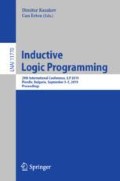Abstract
This paper provides a new algorithm of computing a least generalization of a set of atoms. Our algorithm is based on the notion of anti-combination that is the inverse substitution of a combined substitution. In contrast to an anti-unification algorithm that computes a least generalization of two atoms, anti-combination can compute a least generalization of (more than two) atoms in parallel. We evaluate the proposed algorithm using randomly generated data and show that anti-combination outperforms the iterative application of an anti-unification algorithm in general.
Access this chapter
Tax calculation will be finalised at checkout
Purchases are for personal use only
Notes
- 1.
- 2.
We use the same symbol \(\le \) over Atom, but the meaning is clear from the context. Note that the relation is often used reversely in the literature, e.g. \(\sigma \ge \theta \) if \(\sigma =\)\( \theta \lambda \) [4].
- 3.
Combination is called parallel composition in [13].
- 4.
Here we draw underlines to help distinguishing 3 terms in P.
References
Chang, C.L., Lee, R.T.C.: Symbolic Logic and Mechanical Theorem Proving. Academic Press, New York (1973)
Delcher, A.L., Kasif, S.: Efficient parallel term matching and anti-unification. J. Autom. Reason. 9, 391–406 (1992)
Nienhuys-Cheng, S.-H., De Wolf, R.: Foundations of Inductive Logic Programming. LNAI, vol. 1228. Springer, Berlin, Heidelberg (1997)
Eder, E.: Properties of substitutions and unifications. J. Symb. Comput. 1, 31–46 (1985)
Grama, A., Karypis, G., Kumar, V., Gupta, A.: Introduction to Parallel Computing, 2nd edn. Addison Wesley, Boston (2003)
Gustafson, J.L.: Brent’s theorem. In: Padua, V. (ed.) Encyclopedia of Parallel Computing, pp. 182–185. Springer, Boston (2011). https://doi.org/10.1007/978-0-387-09766-4_80
Kostylev, E.V., Zakharov, V.A.: On the complexity of the anti-unification problem. Discrete Math. Appl. 18(1), 85–98 (2008)
Kuper, G.M., McAloon, K.W., Palem, K.V., Perry, K.J.: A note on the parallel complexity of anti-unification. J. Autom. Reason. 9, 381–389 (1992). https://doi.org/10.1007/BF00245297
Lassez, J.-L., Maher, M.J., Marriott, K.: Unification revisited. In: Mikner, J. (ed.) Foundations of Deductive Databases and Logic Programming, pp. 587–625. Morgan Kaufmann, Burlington (1988)
Lloyd, J.W.: Foundations of Logic Programming, 2nd edn. Springer, Berlin (1987)
Oancea, C., So, C., Watt, S.M.: Generalization in maple. In: Maple Conference, pp. 377–382 (2005)
Østvold, B.M.: A functional reconstruction of anti-unification. Technical report DART/04/04, Norwegian Computing (2004)
Palamidessi, C.: Algebraic properties of idempotent substitutions. In: Paterson, M.S. (ed.) ICALP 1990. LNCS, vol. 443, pp. 386–399. Springer, Heidelberg (1990). https://doi.org/10.1007/BFb0032046
Plotkin, G. D.: A note on inductive generalization. In: Machine Intelligence, vol. 5, pp. 153–163. Edinburgh University Press (1970)
Prawitz, D.: Advances and problems in mechanical proof procedures. In: Machine Intelligence, vol. 4, pp. 59–71. Edinburgh University Press (1969)
Reynolds, J.C.: Transformational systems and the algebraic structure of atomic formulas. In: Machine Intelligence, vol. 5, pp. 135–151. Edinburgh University Press (1970)
Yamasaki, S., Yoshida, M., Doshita, S.: A fixpoint semantics of Horn sentences based on substitution sets. Theor. Comput. Sci. 51, 309–324 (1986)
Yoshida, M., Sakama, C.: Computing least generalization by anti-combination (short paper). Presented at ILP-14 (formally unpublished) (2014)
Acknowledgment
This research is funded by Vietnam National University – Ho Chi Minh city (VNU-HCM) under grant number C2019-26-01. We thank Mikio Yoshida for useful discussion on the subject of this paper.
Author information
Authors and Affiliations
Corresponding author
Editor information
Editors and Affiliations
Rights and permissions
Copyright information
© 2020 Springer Nature Switzerland AG
About this paper
Cite this paper
Nguyen, H.D., Sakama, C. (2020). A New Algorithm for Computing Least Generalization of a Set of Atoms. In: Kazakov, D., Erten, C. (eds) Inductive Logic Programming. ILP 2019. Lecture Notes in Computer Science(), vol 11770. Springer, Cham. https://doi.org/10.1007/978-3-030-49210-6_8
Download citation
DOI: https://doi.org/10.1007/978-3-030-49210-6_8
Published:
Publisher Name: Springer, Cham
Print ISBN: 978-3-030-49209-0
Online ISBN: 978-3-030-49210-6
eBook Packages: Computer ScienceComputer Science (R0)

